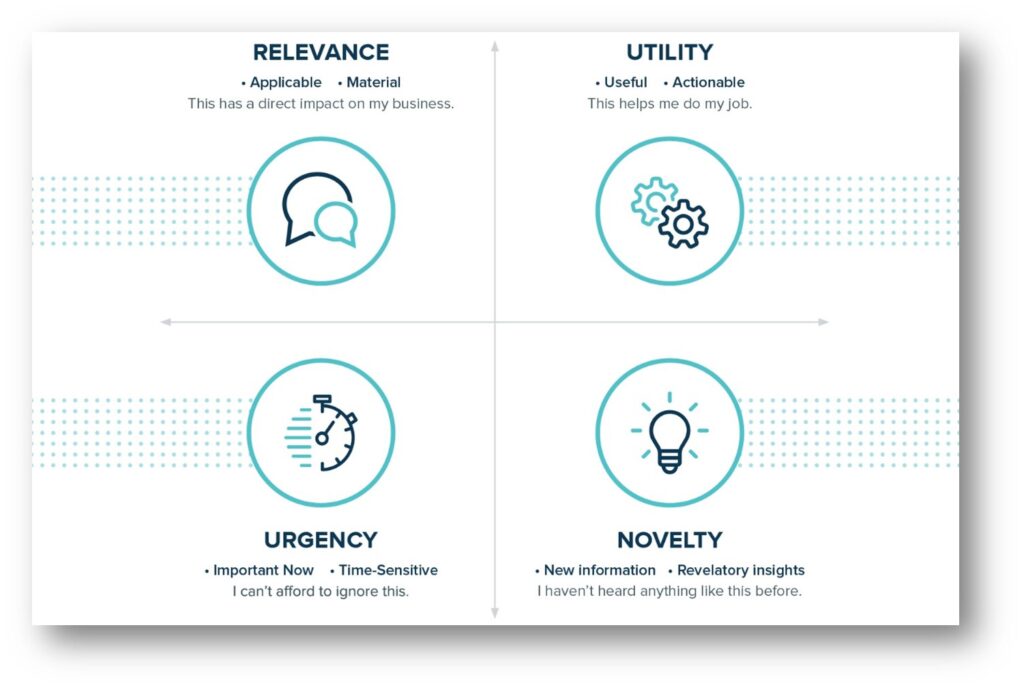As AI-generated answers and content hog the search spotlight, pushing high-quality owned content through owned channels is a winning strategy for professional services firms
By now, we’ve all seen AI-generated answers in response to human-written questions. Google’s AI Overviews — powered by the Gemini Large Language Model, or LLM — now takes pride of place in search results, often directly over the content it references.
That’s worrisome for marketers at professional services firms, whose experts have suddenly been thrust into competition with the AI noise. If searchers can get the answers they need without clicking through to your firm’s website, your thought leadership can’t attract attention or build authority for your business. After all, according to Greentarget’s latest State of Digital survey, firm or company websites are still the second most valuable source of information for professional services firm leaders, trailing only — you guessed it — search engines.
At least, that’s the case for now. To maintain their firms’ positions of authority, marketers will need to pivot to smart owned content and distribution strategies. Here’s why and how they can do so.
How AI-Generated Answers Inflame the Fight for Attention
As communicators, we’re trained to compete with other ideas. Now, we must compete with infinite permutations of ideas, and the AI-generated syntheses pushed by search and social platforms.
That’s a problem, because for years publishers have relied on search to send an audience, with 63.4% of traffic referred on the U.S. web coming from Google as of January 2024. Even with that high number though, Google was keeping most searchers to itself — only 36% of Google searches send users to non-Google-owned, non-advertising websites. Almost 60% of searchers never go anywhere; they either accept the Google summary or search again. As AI answers continue to roll out in search, that number is only expected to go up.
Publishers are already feeling the impact: At a recent conference at Columbia University, the President of Scientific American estimated that traffic to the site from Google is down over 30% since AI summaries were introduced. Meanwhile, an editor at 404 Media observed that an AI content farm’s copies of 404’s articles had outranked the source material in search.
Provide Reliable Information, Then Publish Everywhere
Professional services firms won’t be spared.
That’s why, instead of relying on Google to send people to your site, today’s marketers must build their own audiences. That’s not impossible: though Google refers the most traffic, social holds the most attention, comprising 20.75% of web visits. A further 21% goes to productivity apps like email.
With quality owned content like articles and research reports — the preferred content types for in-house counsel and C-suite executives — professional services firms can build an audience elsewhere. Social media channels, email newsletters, YouTube and podcasts all rely on original insights and create an opportunity to take back control of content marketing campaigns. Targeted owned content can also lead to earned media opportunities, as the insights can be leveraged to gain the attention of reporters or repurposed for bylines in external publications. For instance, when Greentarget, working with consulting firm Berkeley Research Group, published an article about how to avoid retail bankruptcies, Law360 reached out to see if the authors could adapt the article for their readers.
Individual subject matter experts can also use owned content for direct email outreach, personalized social posts, or as the foundation for in-person events or webinars. Even better, invite current or prospective clients to collaborate with your thought leaders on the content itself. Finally, consider leveraging paid media (e.g., LinkedIn Ads) to amplify the pieces that perform best organically.
The key concept to remember is create once, publish everywhere. The entire process can be broken down into four steps:
- Maximize owned: Prioritize in-depth content and manage what you can control.
- Leverage your owned content to secure earned media opportunities.
- Broadcast and share on social.
- Utilize paid to further amplify pieces that perform the best organically.
Accept the State of AI in Search Today
While we can no longer rely on search to provide a ready-made audience for our content, we can still earn some benefits from the platform. There are plenty of searches that don’t earn an AI overview, and those are usually the niche, industry-specific queries that professional services firms benefit from most.
Professional services firms should continue to optimize content to compete in traditional search results — less traffic is still traffic, after all. Now though, they must also think about how their content engages with AI-generated answers. Most AI summarizers cite and link to their sources, and those links are a new opportunity to earn traffic, and perhaps more importantly, position your brand as a key source on a relevant topic.
Utilizing a wide range of platforms, as outlined above, will help with that. LLMs build answers based on the language most often used. If your brand is associated with a particular subject, you are more likely to be cited as a source in AI answers for that subject. In this way, it’s similar to PR: the more often you’re mentioned, the more likely you are to be mentioned.
Plan for an Even More AI-Powered Tomorrow
This analysis and these recommendations deal with the AI tools of today. AI answers are appearing in search, traffic from search is decreasing as a result, and what it means to search-optimize your content is changing. But this is not the end. Almost all projections show AI tools improving to some extent, and thus playing a greater role in how we gather information. It may not be the full takeover some are predicting, but even a 10 or 20% increase will be keenly felt by those who publish original, relevant content.
We don’t know what the future holds for AI. But we know what the trendline looks like. If you want to stay ahead of it, reach out.







